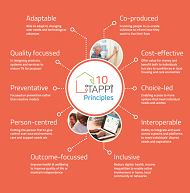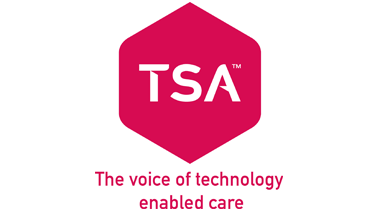About the second phase of TAPPI

The Technology for our Ageing Population: Panel for Innovation (TAPPI) project aims to improve the way technology is used in housing and care for older people.
Led by the Housing Learning and Improvement Network (Housing LIN), the TEC Services Association (TSA) and funded by The Dunhill Medical Trust, TAPPI seeks to address the opportunity that technology has to enhance the lives of our ageing population and the barriers that prevent its adoption.
The first phase of TAPPI, which concluded in 2021, examined current practice and then set out ten practical principles for using technology in housing and care for older people.
In this second phase, 'From Principles to Implementation' lasting 12-15 months,digital services and solutions will be assessed using the original TAPPI principles in six demonstrator sites to ensure they are: Adaptable, Co-produced, Cost-effective, Choice-led, Interoperable, Inclusive, Outcome-focused, Person-Centred, Preventative and Quality-focused.
This phase will gather evidence of what is possible and challenge what is perceived to be impossible, building on learning gathered during the pandemic. The goal is to create new, scalable housing service models using technology-enabled care which support personalisation and, simply, deliver better outcomes for people.
TAPPI Phase 2: From Principles to Implementation is extremely timely with the government's recent white paper on adult social care placing emphasis on how technology can advance sector transformation and the allocation of funding to support the delivery of innovative new models of care.
In this second phase, TAPPI seeks to co-produce a ‘TAPPI Framework’ by working with six locality ‘testbeds’ (or demonstrator sites), led by community-based organisations who are interested in ensuring that the principles proposed during Phase 1 are developed and tested in real settings. This phase will gather the evidence of what is possible and challenge what is perceived to be impossible, building upon the learning gathered during the pandemic and creating new and scalable housing service models using technology-enabled care which supports personalisation and, simply, delivers better outcomes for people.
The programme is co-produced with the successful Co-production and engagement partner, Evaluation and shared learning partner and the six locality 'testbeds' (or demonstrator sites) over a 12-15-month period.
We envisage that it will include, but is not limited to:
- The creation of a TAPPI Framework demonstrating how the principles proposed in TAPPI Phase 1 have been embedded successfully in a variety of situations.
- A 'TAPPI readiness' tool to help participant organisations identify the areas that require the most support from the programme. The tool will also be repeated at the end of the programme to show the journey travelled of those taking part.
- Development of Service and Technology Standards to support interoperability, minimum digital living standards and alignment with Modern Methods of Construction (MMC).
- Creating case studies and best practice examples to aid and inform others seeking to adopt the principles.
- Developing a suite of tools to create a rounded resource to accompany the Framework.
- Bridging the existing knowledge gap by developing a central place to collate, curate and access knowledge drawing on sector expertise and newly-created content from the learning taking place.
- Exploring ways to address ethical concerns about putting certain types of technology in the homes of vulnerable adults. (Research has shown that some local authorities use this as a barrier for not introducing technology (particularly monitoring) into the homes of older people. The project seeks to challenge and explore these barriers and identify best practice in addressing and overcoming them).
- The creation of a benefits realisation and impact evaluation report.
ACKNOWLEDGEMENTS
TAPPI Phase 2 is funded by The Dunhill Medical Trust (DMT) and supported by the Housing LIN and the TSA.
Following the recruitment of a Co-Production and Engagement partner, an Evaluation and Shared Learning partner, and 6 locality 'testbeds', the programme is co-produced with the successful applicant organisations over a 12-15-month period.



